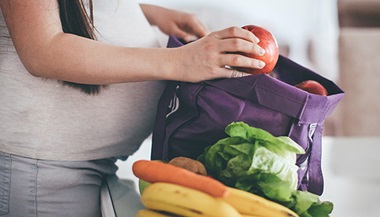5 Breastfeeding Diet Myths
Myth #1: Focusing on certain foods will increase your milk supply
One of the top concerns for breastfeeding moms is making enough milk to meet their baby’s needs. Some women add so-called “breastfeeding foods” to their diets specifically to boost their milk production, including:
- Oatmeal
- Barley
- Brewer’s yeast
- Ginger
- Basil
- Banana
- Pumpkin
But there’s no proof that these actually work. Many of the foods that people say will increase milk supply have been used for centuries in various cultures and are very nutritious. It certainly doesn’t hurt to include these foods in your diet, but you may not see significant changes in your supply.
From a nutritional standpoint, it’s important to make sure you’re eating enough food. In general, nursing mothers should consume a minimum of 1,800 calories per day. But caloric needs vary depending on activity level and body size, so ask your doctor or dietitian what’s appropriate for you.
Breastfeeding women also lose an average of 25 ounces of fluid a day through their milk. You don’t need to track the ounces of fluid you consume, but be sure to drink whenever you’re thirsty, preferably water, and watch for signs of dehydration, such as:
- Dark yellow urine
- Infrequent urination
- Dry mouth
It’s important to stay hydrated and eat a nutrient-dense diet similar to what you ate during pregnancy. You need enough vitamins and minerals to support two people. Also, try to get as much rest as possible and take care of yourself so both you and your baby get what you need to stay healthy.
In general, the best way to increase your milk supply is to breastfeed or pump frequently. If you’re concerned about your milk supply, a lactation specialist, your child’s pediatrician or your doctor can help you get to the root of the problem. They can assess:
- If you are actually making sufficient milk.
- If the baby is transferring milk properly.
If there are any underlying medical conditions that need to be addressed.
Myth #2: You have to avoid certain foods so your baby doesn’t get gassy
When a breastfed baby fusses for seemingly no reason, it’s often attributed to gas caused by something the mom ate. But this isn’t true in most cases. For a majority of people, what you eat is not going to make your baby feel bad.
However, your breast milk does change flavor depending on what you consume. Breast milk flavors accustom your child to the types of foods your family eats. Your baby may be a bit reluctant to try different flavored breast milk, especially if it’s garlicy or spicy, but the flavor won’t hurt them.
It’s a different story for babies who have a food allergy or sensitivity, most commonly a reaction to dairy in the mother’s diet. Only about 3% of exclusively breastfed babies have this problem.
Signs that your child may have a serious problem include:
- Blood or mucus in poop
- Vomiting
- Diarrhea
- Wheezing or difficulty breathing
- Skin rash, eczema or hives
- Severe fussiness
- Indications of abdominal pain like a tight, swollen belly
If you’re concerned your baby is having an allergic reaction, immediately contact your pediatrician. But if you’re simply noting that your child doesn’t feed as well or consistently seems more fussy or gassy after you eat certain foods, consider avoiding those items for a few days to see if it helps.
Myth #3: Breastfeeding will make you lose weight
One of the biggest misconceptions about breastfeeding is that it’s going to make the weight you gained during pregnancy just fall off without any effort. But that’s not everyone’s experience. Many people find that they hold on to a little bit of weight while they’re nursing. Breastfeeding moms often feel very hungry and may eat more.
Trying to lose weight too soon after childbirth can also jeopardize your milk production. Wait at least two months for your milk supply to be firmly established before actively trying to lose weight. Aim for gradual weight loss — no more than 4–5 pounds a month — because drastically cutting calories or rapidly losing weight can impact your milk supply.
The best breastfeeding diet? Focus on balanced meals packed with nutrient-rich foods and reasonable portions. Eat in a way that makes you feel energized and helps you gradually lose weight. It pays to remember that it took nine months to gain the weight, so it’ll take time to get back to your pre-pregnancy weight.
What Really Helps You Bounce Back After Pregnancy

Motherhood changes you inside and out. These changes are evidence of the work your body has done. As you adjust to your new life with baby, it’s important to remember that your mind and emotions are also changing, so be sure to give yourself the support you need.
Myth #4: Caffeine while breastfeeding is a no-no
Women who enjoy a cup of coffee (and the energy boost it provides) can rejoice: Caffeine isn’t off-limits while breastfeeding. Research has found that only about 1% of the caffeine you drink ends up in breast milk.
If you want caffeine, you can drink up to 200 milligrams per day (about two 8-ounce cups of coffee) without any worries. Just be sure to consider all sources of caffeine in your total limit for the day, including:
- Coffee and tea
- Caffeinated soda
- Chocolate and cocoa powder
- Some pain relievers
Also, experts note that younger babies are more sensitive to caffeine in breast milk. If you’re consuming caffeine and notice your newborn having difficulty sleeping after breastfeeding, you may want to scale back your caffeine intake.
Myth #5: Alcohol and breastfeeding don’t mix
Alcohol does pass through breast milk to your baby. So, it’s certainly true that you don’t want to nurse your baby while drinking alcohol or shortly thereafter. But you can have an occasional drink as long as you take some precautions.
To be safe, you should wait two hours after having a drink to feed your baby. (One standard drink is 12 ounces of regular beer, 5 ounces of wine or 1½ ounces of liquor.) Alcohol enters breastmilk and then the level decreases over time, similar to the way it gradually leaves your blood. If your breasts get uncomfortably full before enough time passes, you can pump the alcohol-laced breast milk and dump it.
The other thing breastfeeding moms should know is that alcohol may inhibit your milk flow (let-down) and reduce the amount of milk babies get, and even reduce your milk supply if consumed daily.
Knowing the truth about what can impact your health and your baby’s is essential for feeling relaxed and happy while breastfeeding. And since breast milk naturally adjusts to give your child the right amount of protein, carbohydrates and fat needed for growth, you can feel good knowing your baby is getting the ultimate superfood.
Sign Up for Our Free Newsletter

One of the best things you can do to protect and improve your health is to stay informed. Your Health is a FREE e-newsletter that serves as your smart, simple connection to the world-class expertise of Johns Hopkins.






